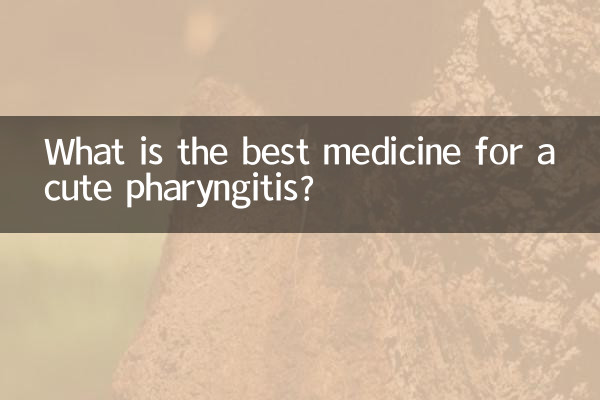What is the best medicine for acute pharyngitis?
Acute pharyngitis is a common disease, mainly characterized by symptoms such as throat pain, redness, swelling, dryness or fever. Recently, there has been a lot of discussion about acute pharyngitis on the Internet, and many patients are concerned about how to quickly relieve symptoms and choose the most effective medicine. This article will combine hot topics and medical advice in the past 10 days to provide you with structured data and analysis to help you better deal with acute pharyngitis.
1. Common symptoms of acute pharyngitis

Symptoms of acute strep throat often include:
| Symptoms | Description |
|---|---|
| sore throat | Pain that worsens when swallowing and may be accompanied by a burning sensation |
| Redness and swelling | Congestion and swelling of the throat mucosa |
| Dryness or foreign body sensation | Feeling like your throat is dry or something is stuck in your throat |
| Fever | Some patients may be accompanied by low-grade fever or high fever |
| cough | Dry cough or phlegm, especially worse at night |
2. Recommended drug treatment for acute pharyngitis
According to recent feedback from medical experts and patients, the following drugs are more effective in treating acute pharyngitis:
| drug type | Representative medicine | function |
|---|---|---|
| antibiotics | amoxicillin, cephalosporins | Suitable for bacterial infections, use under the guidance of a doctor |
| antipyretic analgesics | Ibuprofen, acetaminophen | Relieve pain and fever |
| throat spray | lidocaine spray, benzocaine spray | Local anesthesia, quick pain relief |
| lozenges | Watermelon Frost Lozenges, Golden Throat Lozenges | Relieve throat discomfort, anti-inflammation and sterilization |
| Chinese patent medicine | Isatis granules, Pudilan anti-inflammatory tablets | Clear away heat and detoxify, anti-inflammatory and reduce swelling |
3. Home care suggestions for acute pharyngitis
In addition to medication, the following home care methods can also help relieve symptoms:
| Nursing methods | Specific operations |
|---|---|
| drink more water | Keeps throat moist and reduces irritation |
| Gargle with warm salt water | 3-4 times a day, anti-inflammatory and sterilizing |
| Avoid spicy food | Reduce throat irritation |
| Get enough rest | Enhance immunity and promote recovery |
| Use a humidifier | Maintain air humidity and relieve dryness |
4. When do you need medical treatment?
If the following situations occur, it is recommended to seek medical treatment promptly:
| Symptoms | Possible reasons |
|---|---|
| High fever that persists (above 39°C) | Possible serious infection |
| Trouble breathing or swallowing | It may be an emergency such as epiglottitis |
| Symptoms persist for more than a week | Other diseases need to be ruled out (such as tonsillitis) |
| swollen lymph nodes in neck | Antibiotic treatment may be required |
5. Recent popular questions and answers
Based on the online discussions in the past 10 days, the following are the issues that patients are most concerned about:
| question | answer |
|---|---|
| Can acute pharyngitis heal on its own? | Mild cases can heal on their own, but you need to pay attention to rest and care; severe cases require drug intervention. |
| Is it better to take antibiotics faster? | Only effective against bacterial infections, misuse may lead to drug resistance |
| Can honey water relieve sore throat? | It has certain lubricating and anti-inflammatory effects, but does not replace drug treatment. |
Summary
The treatment of acute pharyngitis requires drug selection based on the cause and symptoms. Mild cases can be relieved through home care, while severe cases should seek medical treatment in time. Rational use of medication and scientific care are the keys to rapid recovery. I hope the structured data in this article can provide you with a practical reference!

check the details

check the details